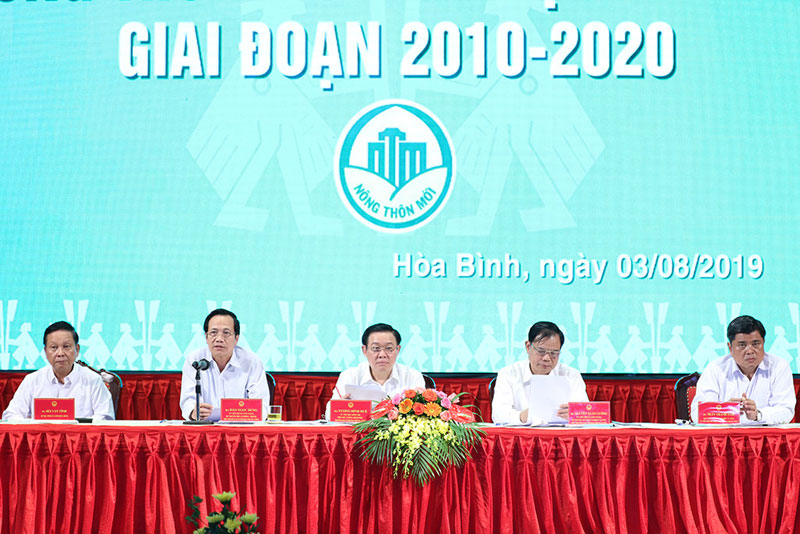
(HBO) - The National Steering Committee for National Target Programmes for 2016-2020 held a conference in Hoa Binh province to review new-style rural area building work in the northern mountainous area in the past decade and set out tasks for the post-2020 period.
The conference was chaired by Deputy Prime Minister and head
of the committee Vuong Dinh Hue. Hoa Binh’s leaders attending the event
included Bui Van Tinh, member of the Party Central Committee and Secretary of
the provincial Party Committee; and Bui Van Khanh, Vice Secretary of the
provincial Party Committee and Chairman of the provincial People’s Committee.
The conference, the first regional-level of its kind,
featured One Commune-One Product (OCOP) stalls run by different provinces.
 Deputy PM Vuong Dinh
Hue, representatives of ministries and sectors and leaders of Hoa Binh province
at the event.
Deputy PM Vuong Dinh
Hue, representatives of ministries and sectors and leaders of Hoa Binh province
at the event.
As of the end of June, northern mountainous provinces had
603 out of its total 2,280 communes, or 26.4 percent, meeting the new-style
rural standard. By the end of 2019, the figure is expected to hit 28 percent, fulfilling
the goal one year ahead of schedule as set in the Prime Minister’s Decision No
1600/QD-TTg issued on August 16, 2016.
Currently, the entire region has no communes meeting less
than five criteria of the standard. Each local commune meets 12.28 criteria on
average, lower than the national average of 15.26 criteria per commune.
Meanwhile, six local districts have so far been accredited by the PM as
new-style rural areas.
In the 2021-2025 period, the region sets to have at least
one province completing its new-style rural building mission, and each province
having one district meeting the standard.
Speaking at the conference, Bui Van Tinh shared Hoa Binh’s
experiences and methods in building new-style rural areas. The province has to
date had 71 out of 191 communes completing the work one year ahead of schedule.
The figure is expected to reach 77 by the end of 2019.
Deputy PM Vuong Dinh Hue suggested localities involved focus
on implementing the OCOP programme, adding that attention should also be paid
to preserving traditional cultural identities and protecting the environment./.
Hoa Binh province is undergoing a dynamic transformation amid Vietnam’s national digital transition. Building on Poliburo’s Resolution No. 57-NQ/TW on breakthroughs in science, technology, innovation, and national digital transformation, the province has rolled out a wide range of practical action plans. A standout initiative is the "Digital Literacy for All” movement, an effort to ensure that no one is left behind in the digital era.
Hoa Binh province is undergoing a dynamic transformation in the wake of the national digital transformation movement. Building on Resolution No. 57-NQ/TW of the Politburo on breakthroughs in science, technology, innovation, and national digital transformation, the province has implemented a wide range of practical action plans. A standout initiative is the "Digital Literacy for All” movement ambitious effort to ensure that no one is left behind in the digital age.
With a spirit of unity and proactive problem-solving, the Party Committee, the government and the people of Dong Lai Commune (Tan Lac District) have made great strides in implementing the resolutions of the 24th Party Congress of the commune for the 2020 - 2025 term. Focusing on leadership and practical actions, the commune has brought the Party’s resolutions into daily life, creating strong impacts and pushing the local development forward.
Amid the nationwide push for digital transformation, young people in Hoa Binh Province are stepping up as dynamic pioneers, applying technology to enhance Youth Union operations and expand the reach of youth-led initiatives. Through creativity and adaptability, Youth Union organizations at all levels have introduced a series of practical solutions, contributing to modern governance and community development.
In recent years, An Nghia commune, located in Lac Son district, has stepped up administrative reform, focusing on improving the quality and efficiency of its single-window service unit for receiving and processing administrative procedures. These improvements have helped create favourable conditions for local residents and organisations to handle administrative procedures, contributing to the commune’s broader socio-economic development.
The Prime Minister-approved master plan to develop the multi-use value of forests ecosystems through 2030, with a vision to 2050, aims to improve the management and sustainable use of forest resources, create jobs, increase incomes, and improve the living standards of ethnic minorities, people in mountainous and remote areas, forest workers and those living near forests.



 Deputy PM Vuong Dinh
Hue, representatives of ministries and sectors and leaders of Hoa Binh province
at the event.
Deputy PM Vuong Dinh
Hue, representatives of ministries and sectors and leaders of Hoa Binh province
at the event.